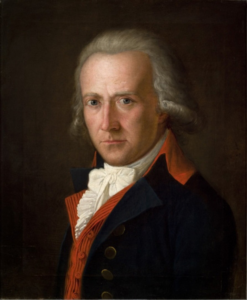Lament
(Poet's title: Klage)
Set by Schubert:
D 415
[April 1816]
Die Sonne steigt, die Sonne sinkt,
Des Mondes Wechselscheibe blinkt,
Des Äthers Blau durchwebt mit Glanz
Der Sterne goldner Reihetanz:
Doch es durchströmt der Sonne Licht,
Des Mondes lächelndes Gesicht,
Der Sterne Reigen, still und hehr,
Mit Hochgefühl dies Herz nicht mehr!
Die Wiese blüht, der Büsche Grün
Ertönt von Frühlingsmelodien,
Es wallt der Bach im Abendstrahl
Hinab ins hainumkränzte Tal:
Doch es erhebt der Haine Lied,
Die Au, die tausendfarbig blüht,
Der Erlenbach im Abendlicht
Wie vormals meine Seele nicht!
The sun rises, the sun sets,
The changing disc of the moon looks down,
The blue of the ether is interweaved with the glow
Of the stars in their golden line dance:
But the sun’s light no longer flows clearly,
The smiling face of the moon,
The dance of the stars, quiet and majestic,
No longer lift this heart with elation!
The meadow blossoms, the green of the bushes
Rings out with the melodies of spring,
In the evening light the brook winds
Down into the valley garlanded by woods:
But the song of the woodlands no longer touches me,
The meadow that blossoms into a thousand colours,
The stream through the alder trees in the light of evening,
These things do not raise my soul as they used to!
All translations into English that appear on this website, unless otherwise stated, are by Malcolm Wren. You are free to use them on condition that you acknowledge Malcolm Wren as the translator and schubertsong.uk as the source. Unless otherwise stated, the comments and essays that appear after the texts and translations are by Malcolm Wren and are © Copyright.
☙
Themes and images in this text:
Alder trees Blue Bushes and undergrowth Colour (general) Dancing Ether Evening and the setting sun Fields and meadows Flowers Gold Green Hearts Laments, elegies and mourning Melancholy Melody Morning and morning songs Night and the moon Rising and falling Rivers (Bach) Soul Spring (season) Stars The sun Valleys Weaving Woods – groves and clumps of trees (Hain) Wreaths and garlands
‘Oh, this is so wonderful. I shall never tire of this’, we say. Then we do.
The realisation that we are depressed, that former delights no longer stimulate us, comes as a shock but at least it shows that, despite appearances, we have not lost all feeling about or interest in the world. Our sadness at the change is itself evidence that our sensitivity remains.
Matthisson’s text, with its careful balancing and parallelism, exhibits an impressive detachment. Its simple listing (without evaluative comments) of former pleasures evokes the blandness and the seeming emptiness of the world as it appears now. Yet such detachment is a result of understanding and analysis rather than languor or enervation. This ability to analyse experience means that we are no longer totally overwhelmed by it and this is perhaps the beginning of control and recovery.
☙
Original Spelling Klage Die Sonne steigt, die Sonne sinkt, Des Mondes Wechselscheibe blinkt, Des Aethers Blau durchwebt mit Glanz Der Sterne goldner Reihetanz: Doch es durchströmt der Sonne Licht, Des Mondes lächelndes Gesicht, Der Sterne Reigen, still und hehr, Mit Hochgefühl dies Herz nicht mehr! Die Wiese blüht, der Büsche Grün Ertönt von Frühlingsmelodien, Es wallt der Bach im Abendstrahl Hinab ins hainumkränzte Thal: Doch es erhebt der Haine Lied, Die Au, die tausendfarbig blüht, Der Erlenbach im Abendlicht Wie vormals meine Seele nicht!
Note on the text
In the 1783 (Dessau) edition of Matthisson’s poetry, these four stanzas were part (stanzas 14 – 17) of a long poem (23 stanzas in total), entitled ‘Die Geliebte‘ (The Beloved). In the 1811 Tübingen edition (which was the basis for the Vienna 1815 edition which was in turn almost certainly Schubert´s source) Matthisson added a fifth stanza to what had become ‘Klage’ (Lament):
O Schmerz! wenn unsrer Jugend Freund
Des Abschieds bittre Zähre weint!
So trifft beim frohen Erntemahl
Des Landmanns Dach ein Wetterstral!
Oh agony, when the friend of our youth
Weeps the bitter tears of farewell!
It is like people at the merry harvest supper
Under the farmer’s roof experiencing a downpour!
Confirmed by Peter Rastl with Schubert’s probable source, Gedichte von Friedrich Matthisson. Erster Theil. Neueste, sehr vermehrte und vollständigste Ausgabe. Wien 1815. In Commission bey Cath. Gräffer und Härter, page 44; and with Gedichte von Friedrich von Matthisson. Erster Theil. Tübingen, bei Cotta, 1811, pages 51-52.
To see an early edition of the text, go to page 51 [73 von 380] here: http://digital.onb.ac.at/OnbViewer/viewer.faces?doc=ABO_%2BZ185186703


